Overview
The article delineates seven pivotal benefits of automated indexing of property maps for title research. These include:
- Enhanced efficiency
- Reduced errors
- Improved data accuracy
Supported by compelling evidence of significant time savings and cost reductions, the advantages of automation are further exemplified by its ability to integrate seamlessly into existing workflows. This transformation underscores how automation revolutionizes the title research process within the real estate sector.
Introduction
Automated indexing of property maps is fundamentally reshaping the landscape of title research. This transformative approach enhances both efficiency and accuracy in document investigation. By harnessing advanced technologies such as machine learning and optical character recognition, this innovative method not only accelerates research timelines but also significantly minimizes human error. Consequently, professionals are empowered to concentrate on more complex tasks that require their expertise.
However, as the industry adapts to these advancements, a pressing question arises: how can real estate firms effectively integrate automated indexing into their existing workflows? Addressing this challenge is essential for maximizing its benefits and maintaining competitiveness in a rapidly evolving market.
Parse AI: Accelerate Title Research with Automated Indexing
Parse AI revolutionizes the document investigation process through the automated indexing of property maps, using the capabilities of machine learning and optical character recognition (OCR) to efficiently extract and organize data. This innovation significantly , allowing title researchers to allocate more time to complex tasks that necessitate human expertise. Consequently, overall productivity in property transactions experiences remarkable enhancement.
Real property experts have noted that the integration of machine learning not only boosts efficiency but also minimizes the likelihood of errors, with automated data entry systems achieving up to a 90% reduction in data entry mistakes. Furthermore, a national company reported a dramatic decrease in clearance time from 2-4 hours to merely 20 minutes, illustrating the tangible advantages of adopting such technologies. In addition, automated data entry systems can cut document retrieval time by 50%, further underscoring the efficiency of Parse AI's solutions.
By streamlining the cataloging process, Parse AI empowers document investigators to make informed decisions more swiftly, ultimately transforming the landscape of title examination in the real estate sector. As one industry specialist remarked, "The implementation of machine learning in document analysis has not only enhanced our workflow but has also greatly reduced errors, enabling us to focus on what truly matters—delivering value to our clients.
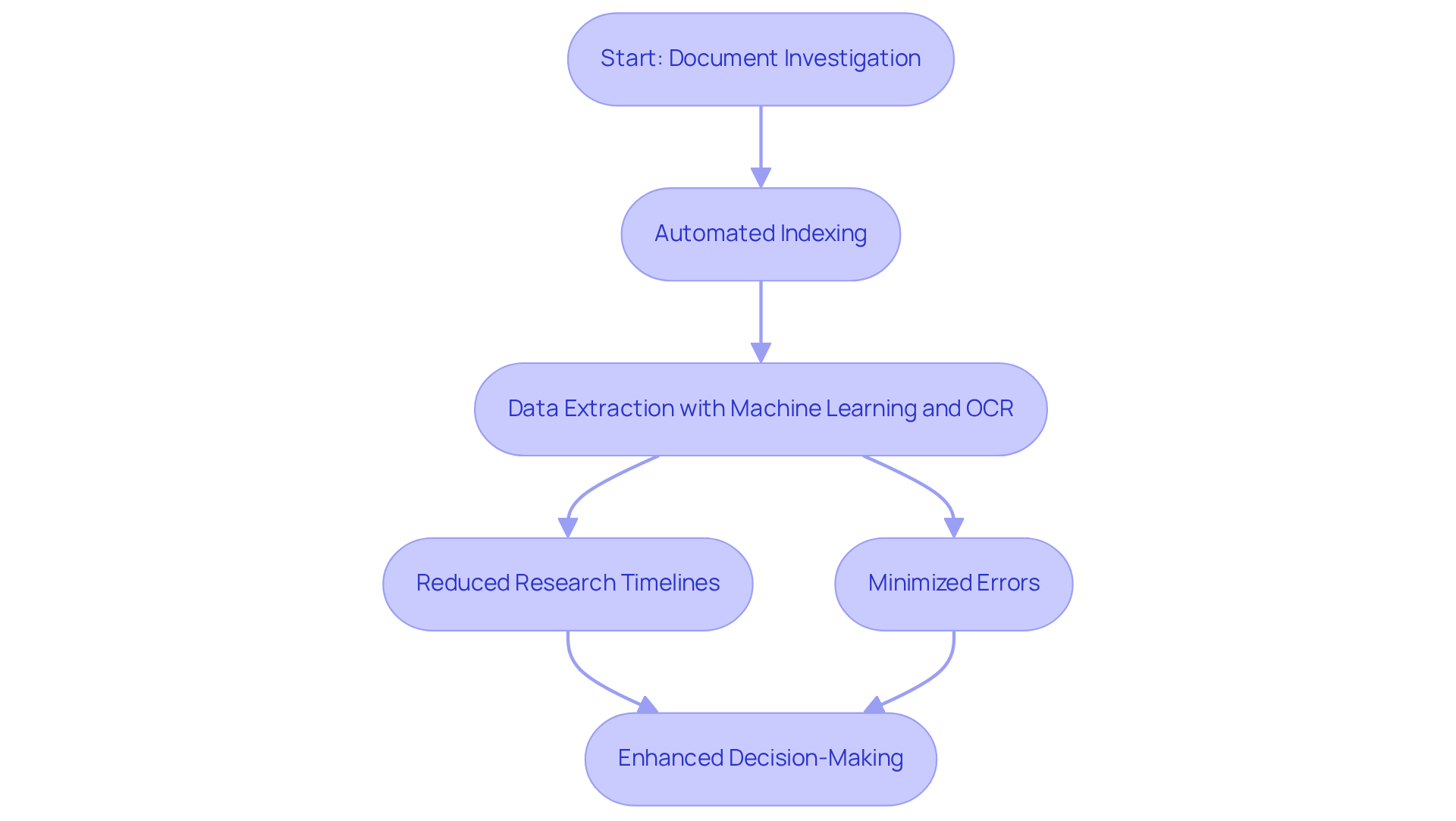
Minimize Human Error through Automated Indexing Solutions
Automated indexing significantly reduces the likelihood of human errors in document investigation. By automating the extraction and organization of data, Parse AI effectively mitigates mistakes that can occur from manual data entry or interpretation. This reliability is crucial for maintaining accurate property records via and ensuring compliance with legal standards, ultimately safeguarding real estate transactions.
Furthermore, we provide flexible subscription options, including:
- Monthly plans
- Annual plans
- Pay-as-you-go plans
This empowers you to select the best fit for your requirements. Our customer success team is readily available to discuss customized solutions that can enhance your document analysis process.
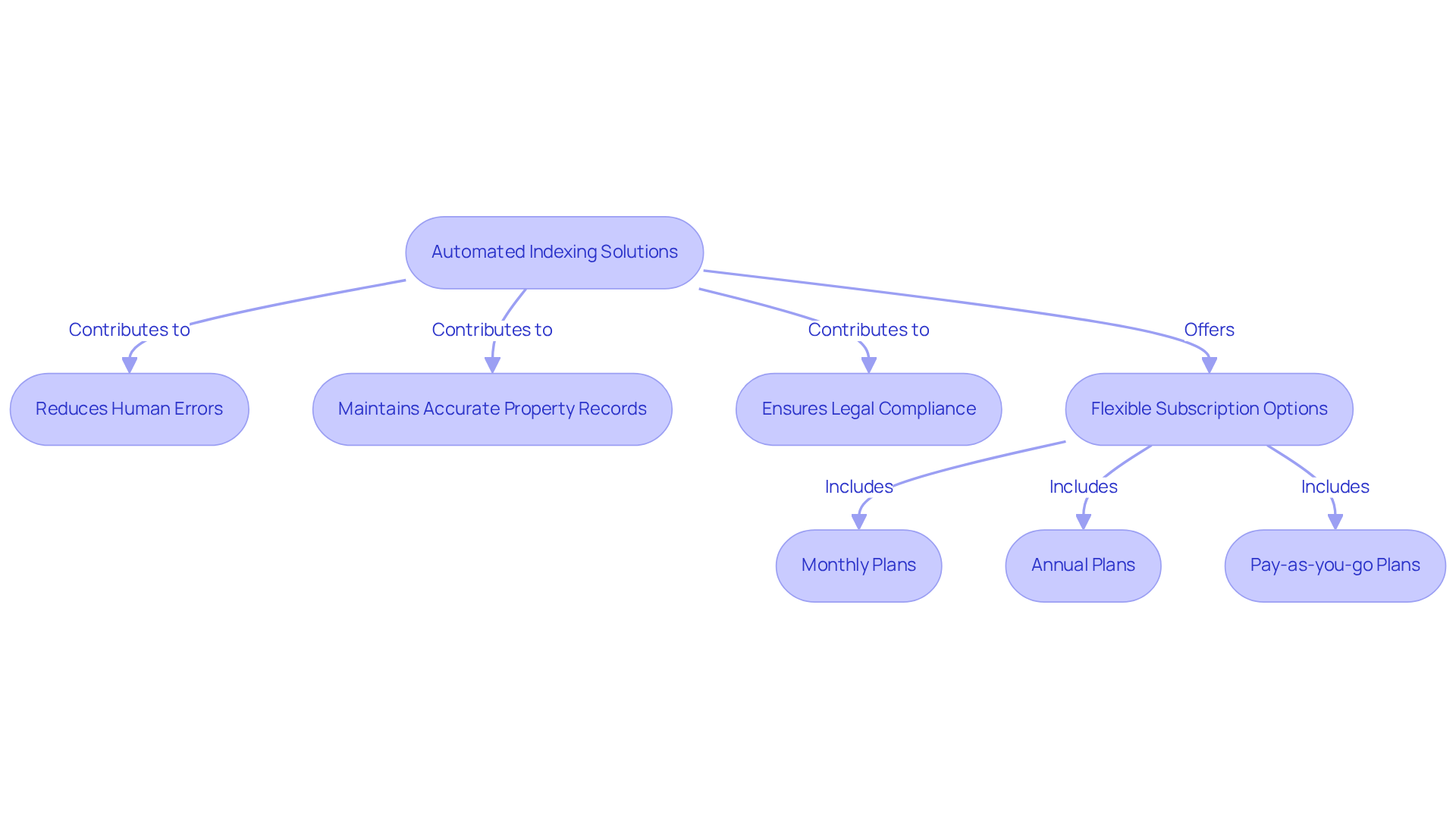
Save Time with Rapid Access to Indexed Property Maps
The process of automated indexing of property maps significantly transforms document investigation, allowing property researchers to retrieve maps much more swiftly than traditional techniques. This rapid access not only accelerates decision-making but also enhances overall efficiency, empowering real estate professionals to respond to client inquiries and finalize transactions with remarkable speed. Consequently, firms that leverage this technology gain a competitive edge in the market.
Title researchers have observed that automation has revolutionized their workflows, with many reporting efficiency improvements that allow them to concentrate more on strategic decision-making rather than time-consuming data collection. According to a recent survey, 88% of respondents plan to utilize digital technologies to enhance company performance over the next 12 to 18 months, underscoring the industry's shift towards automation.
To capitalize on these advantages, leaders in document analysis should consider and regularly assess their impact on workflow efficiency.
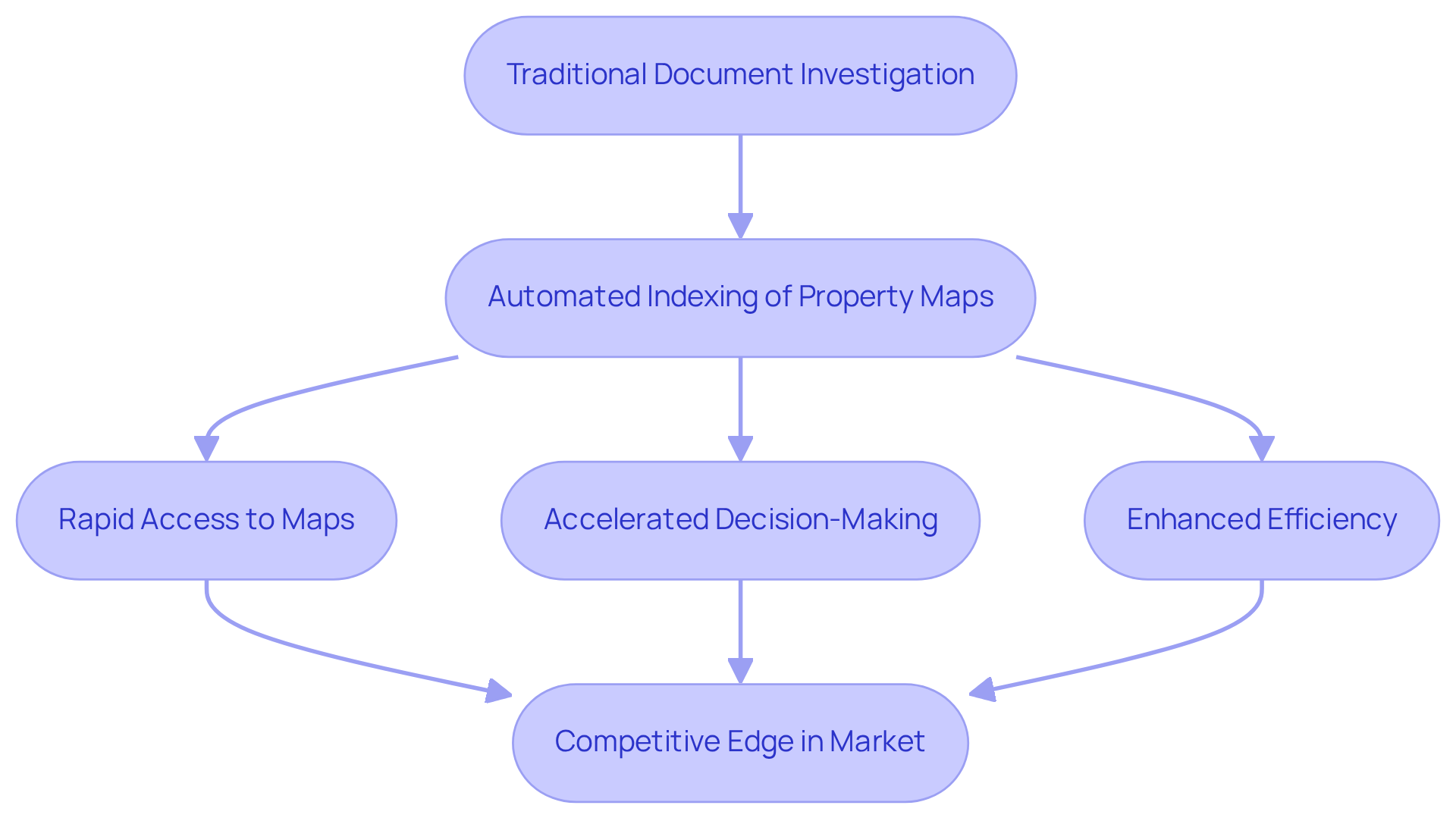
Reduce Costs with Efficient Automated Indexing Processes
Automated cataloging processes are pivotal in achieving substantial cost reductions for title research operations. By streamlining workflows and minimizing the time allocated to manual tasks, real estate professionals can utilize their resources more effectively. This newfound efficiency not only results in but also empowers firms to reinvest in various aspects of their business or pass these savings directly to clients.
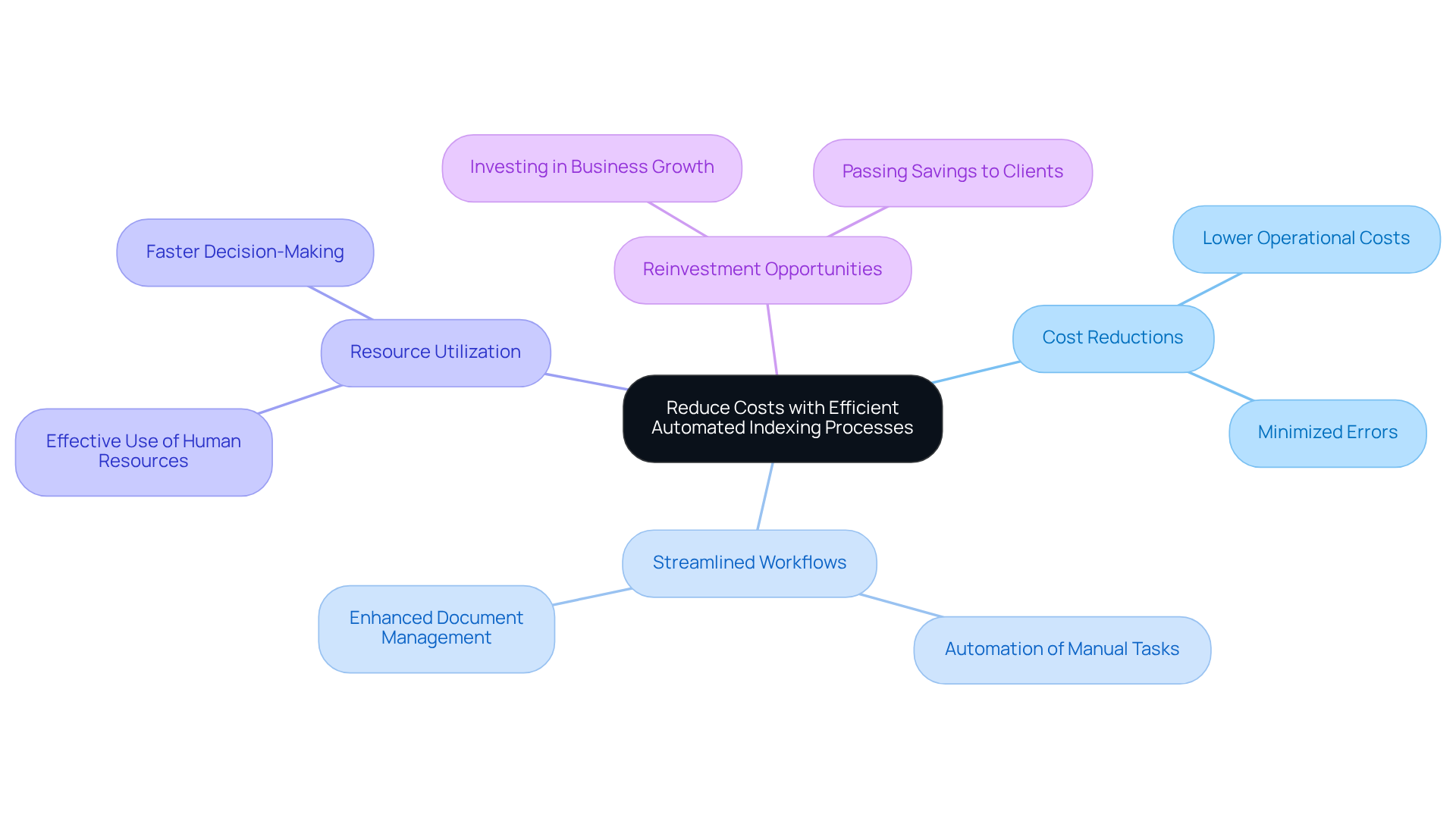
Enhance Data Accuracy for Compliance and Legal Assurance
The automated indexing of property maps significantly enhances data accuracy, which is a fundamental element for compliance with legal standards in property transactions. By guaranteeing that all indexed information is both precise and current, Parse AI supports the automated indexing of property maps, empowering researchers to circumvent potential legal complications stemming from inaccuracies. This proactive approach is vital for within the real estate sector.
Legal experts assert that even minor discrepancies in property data can precipitate considerable legal challenges, which emphasizes the critical need for meticulous accuracy in the automated indexing of property maps. In fact, organizations that prioritize precise data management report a notable decrease in legal disputes, thereby reinforcing the value of automated cataloging as a safeguard against costly errors.
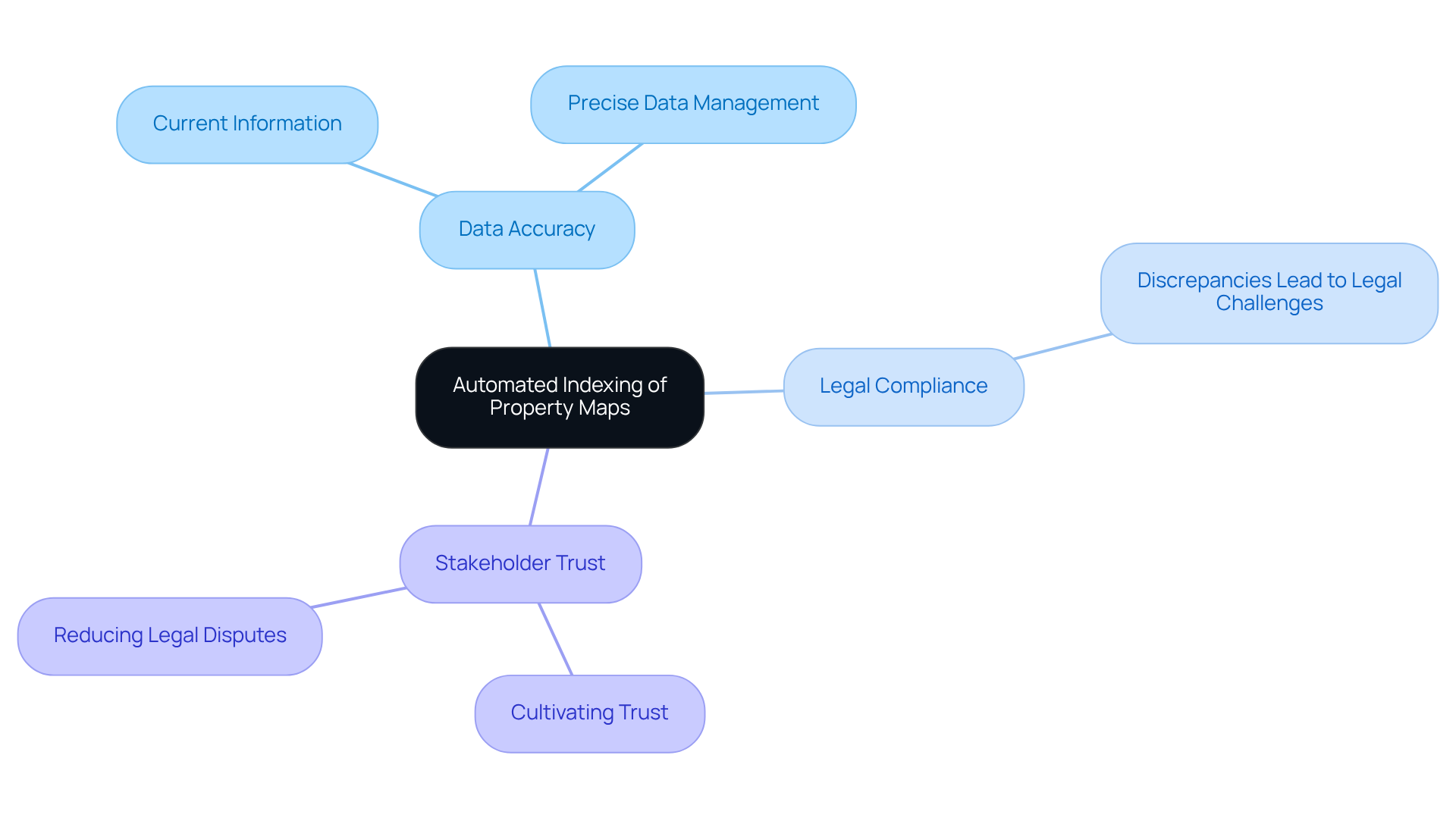
Scale Operations with Flexible Automated Indexing Solutions
Automated indexing of property maps provides essential flexibility for real estate firms, enabling them to scale operations effectively. As these firms expand, the demand for efficient title research intensifies. Parse AI's innovative technology accommodates increasing data volumes and complex indexing requirements, allowing businesses to broaden their service offerings without sacrificing quality or efficiency.
Real property experts recognize that adapting to these heightened demands is critical; as one specialist noted, the ability to manage larger datasets is not just advantageous but essential for sustained growth in today's competitive landscape. This adaptability enhances operational capabilities and positions firms to .
As Theodore Roosevelt stated, investing in well-chosen properties is the surest and safest method of achieving independence, underscoring the importance of effective data management in securing long-term success. Furthermore, the belief that real estate rewards hard work highlights the necessity for firms to adopt automated indexing of property maps to streamline processes and enhance productivity.
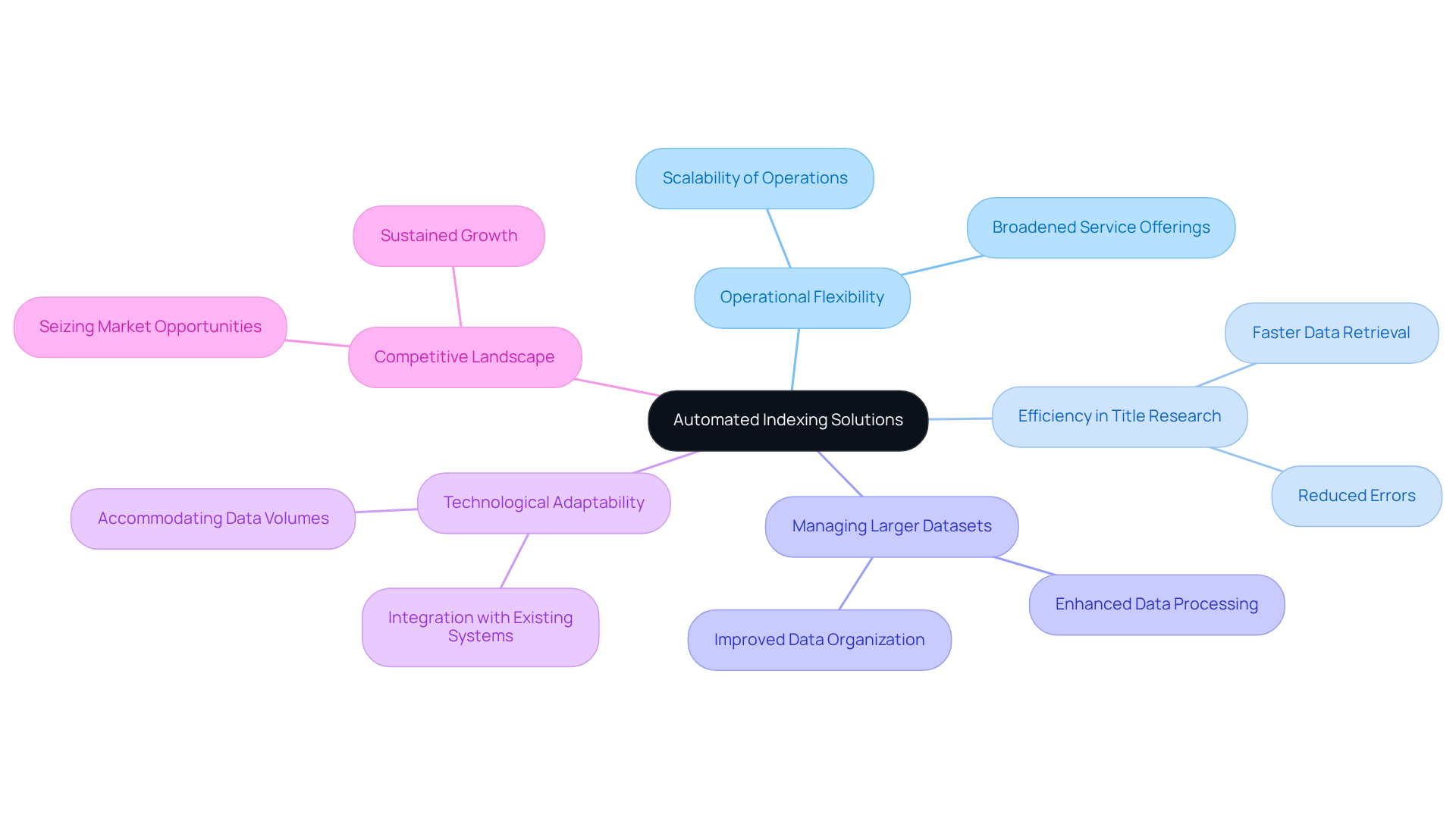
Integrate Automated Indexing into Existing Title Research Workflows
Incorporating automated indexing of property maps into current document workflows is a seamless process with Parse AI. This platform is designed explicitly to enhance existing operations, empowering researchers to boost their efficiency without necessitating a complete system overhaul. Such straightforward integration not only facilitates rapid adoption but also enables organizations to quickly realize the benefits of automation.
For example, firms that have embraced automation report an average annual savings of $46,000, emphasizing the financial advantages of these innovations. Furthermore, businesses can save up to $130,000 annually by automating various strategies, illustrating the broader financial impact of automation across industries.
Title researchers have observed that the significantly enhances their workflow, with 86% of employees asserting that automation will improve their work efficiency. Moreover, automation can reduce manual errors by as much as 90%, directly enhancing precision in document analysis.
Consequently, the implementation of automated indexing of property maps improves existing workflows, thereby boosting both efficiency and accuracy in title research.
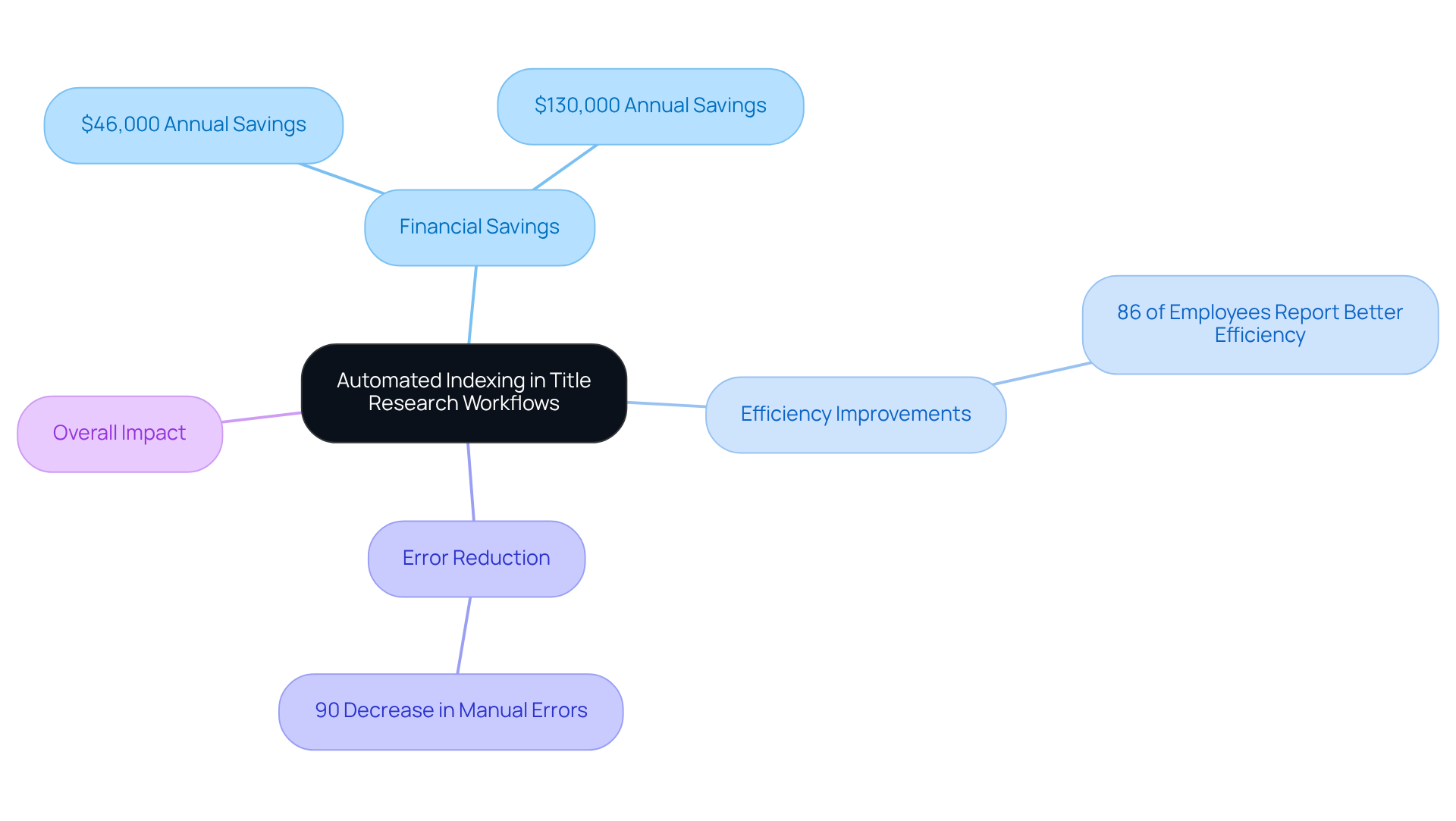
Access Indexed Property Maps Anytime, Anywhere
Automated indexing of property maps empowers researchers to access indexed maps anytime and anywhere, significantly enhancing their workflow. This flexibility is particularly beneficial for professionals working remotely or those who need while on the move. The capacity to retrieve crucial information from any location not only boosts productivity but also heightens responsiveness in property transactions.
For instance, mobile access allows researchers to swiftly address client inquiries, thereby facilitating faster decision-making and smoother transactions. Real property experts have noted that this level of accessibility leads to a considerable increase in efficiency, with many asserting that they can complete tasks in a fraction of the time compared to traditional methods. Indeed, companies gain an additional 240 hours of work per year from employees due to mobile working, equating to approximately $5,114 in extra work per employee.
Stacy Holden, an industry principal, underscores that having greater visibility into the business at their fingertips ultimately provides property managers with agility and the ability to make better business decisions more swiftly. The convenience of mobile access fundamentally transforms how ownership research is conducted, with automated indexing of property maps becoming an essential tool in today’s fast-paced real estate environment.
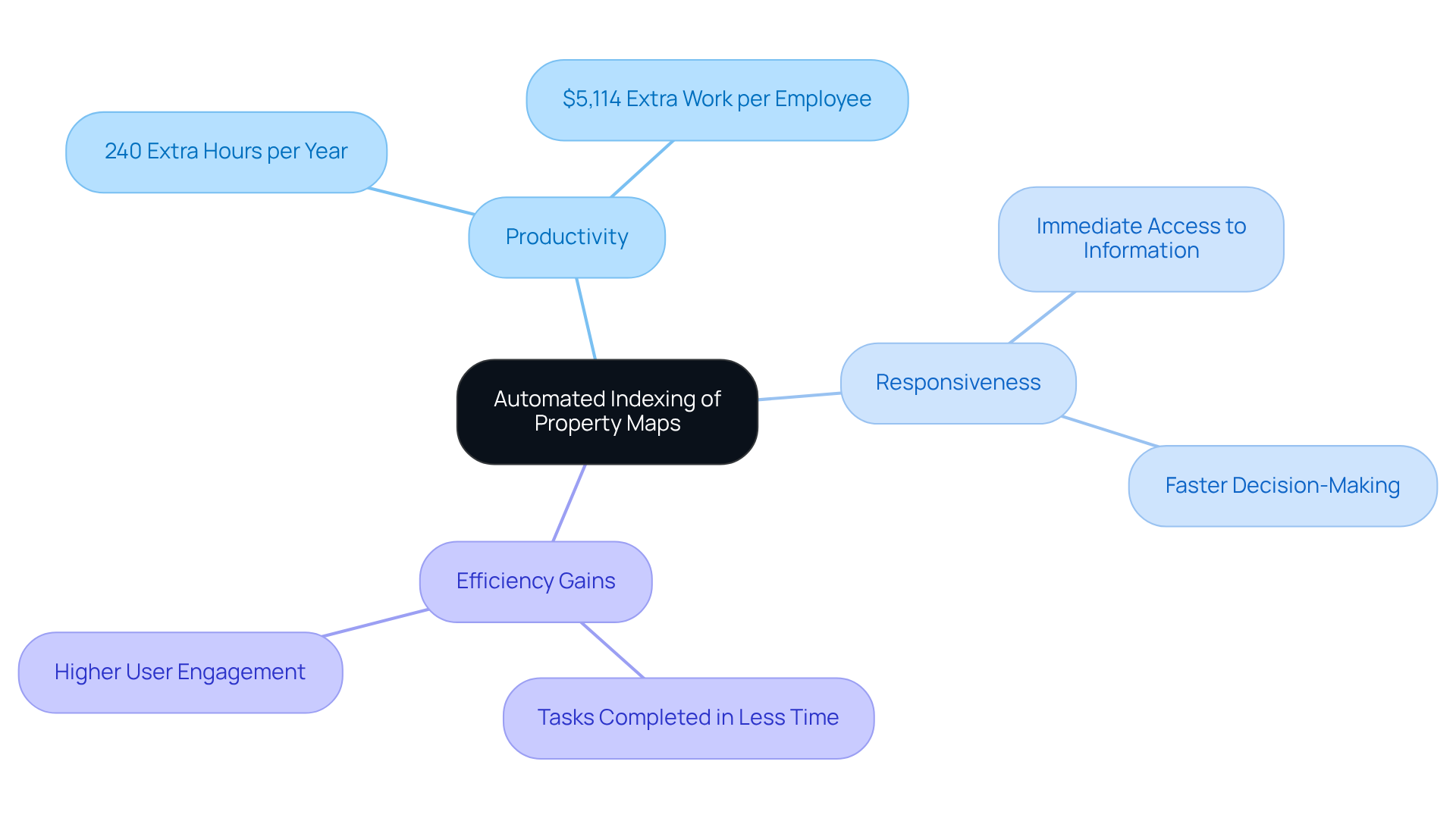
Simplify Complex Legal Language with Automated Indexing
Automated indexing significantly simplifies the complex legal language often found in property documents. This innovation extracts and presents it in a more digestible format, empowering title researchers to navigate the intricacies of legal texts with greater ease. Such simplification enhances the accuracy of interpretations and minimizes the risk of miscommunication in real estate transactions.
For instance, AI tools can analyze extensive legal documents, identifying key terms and clauses crucial for understanding property law. Consequently, legal professionals can complete their research 24.5% faster than traditional methods, leading to more efficient workflows and improved outcomes.
Furthermore, perspectives from legal professionals emphasize the persistent difficulties in understanding property law, underscoring the importance of automated categorization in addressing these challenges. By leveraging technology, document researchers achieve a clearer understanding of legal texts, ultimately facilitating smoother transactions and better decision-making.
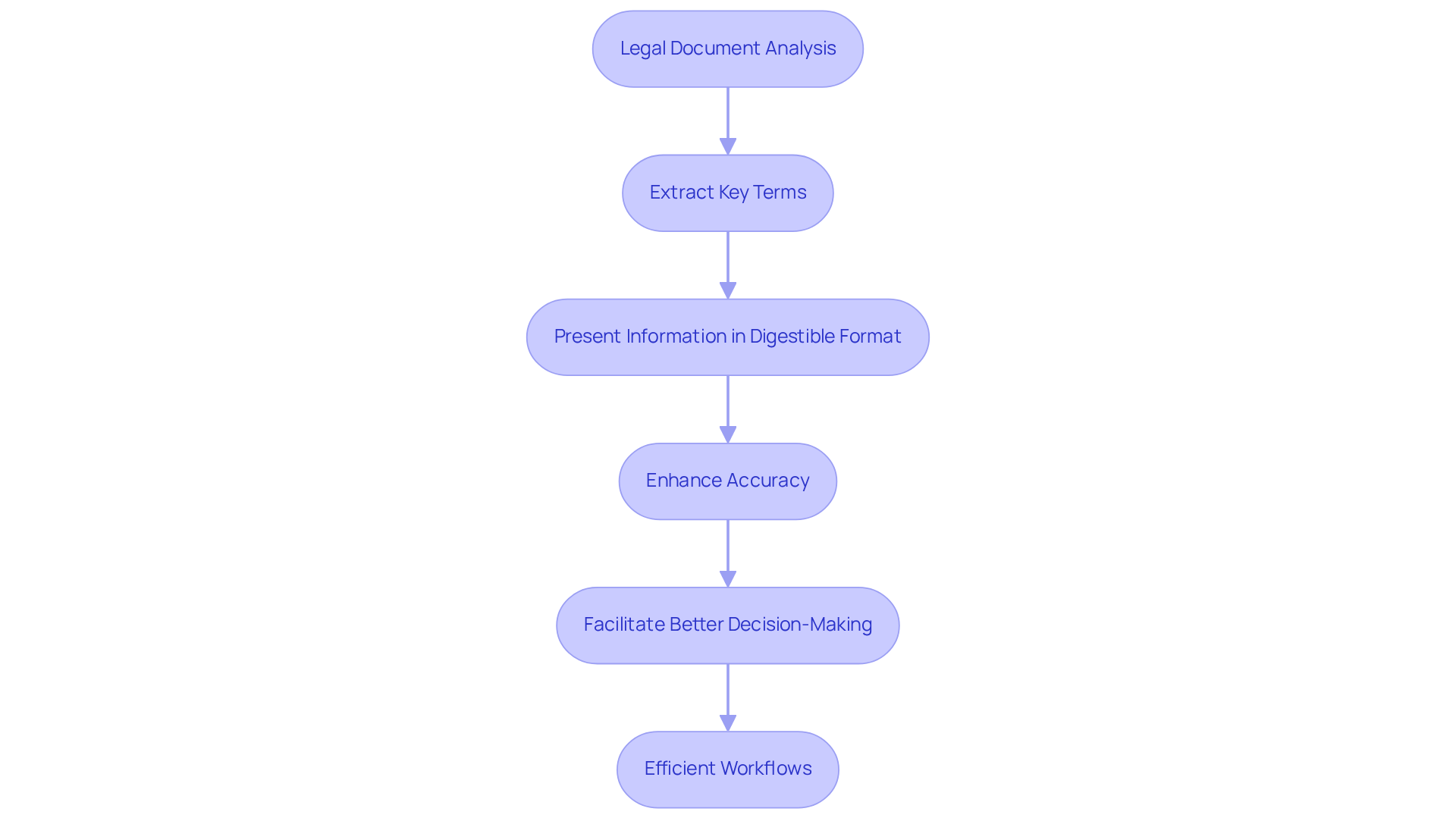
Benefit from Continuous Improvement in Automated Indexing Technologies
The landscape of automated indexing of property maps is in a state of constant evolution, propelled by technological advancements and refined methodologies. Parse AI is dedicated to spearheading these innovations, ensuring that researchers in the field benefit from the latest developments. This focus on continuous enhancement significantly boosts the effectiveness of property examination procedures, allowing for the , which enables professionals to operate with greater efficiency and precision.
As industry leaders recognize, the future of automated cataloging in document analysis is bright, with many underscoring its capacity to transform workflows and enhance productivity. Furthermore, organizations that prioritize ongoing improvement in the automated indexing of property maps are poised to achieve substantial gains in operational efficiency and accuracy, ultimately leading to enhanced service delivery and cost reductions.
The integration of advanced indexing technologies not only streamlines the research process but also equips users with the finest tools available, establishing a new benchmark in the industry.
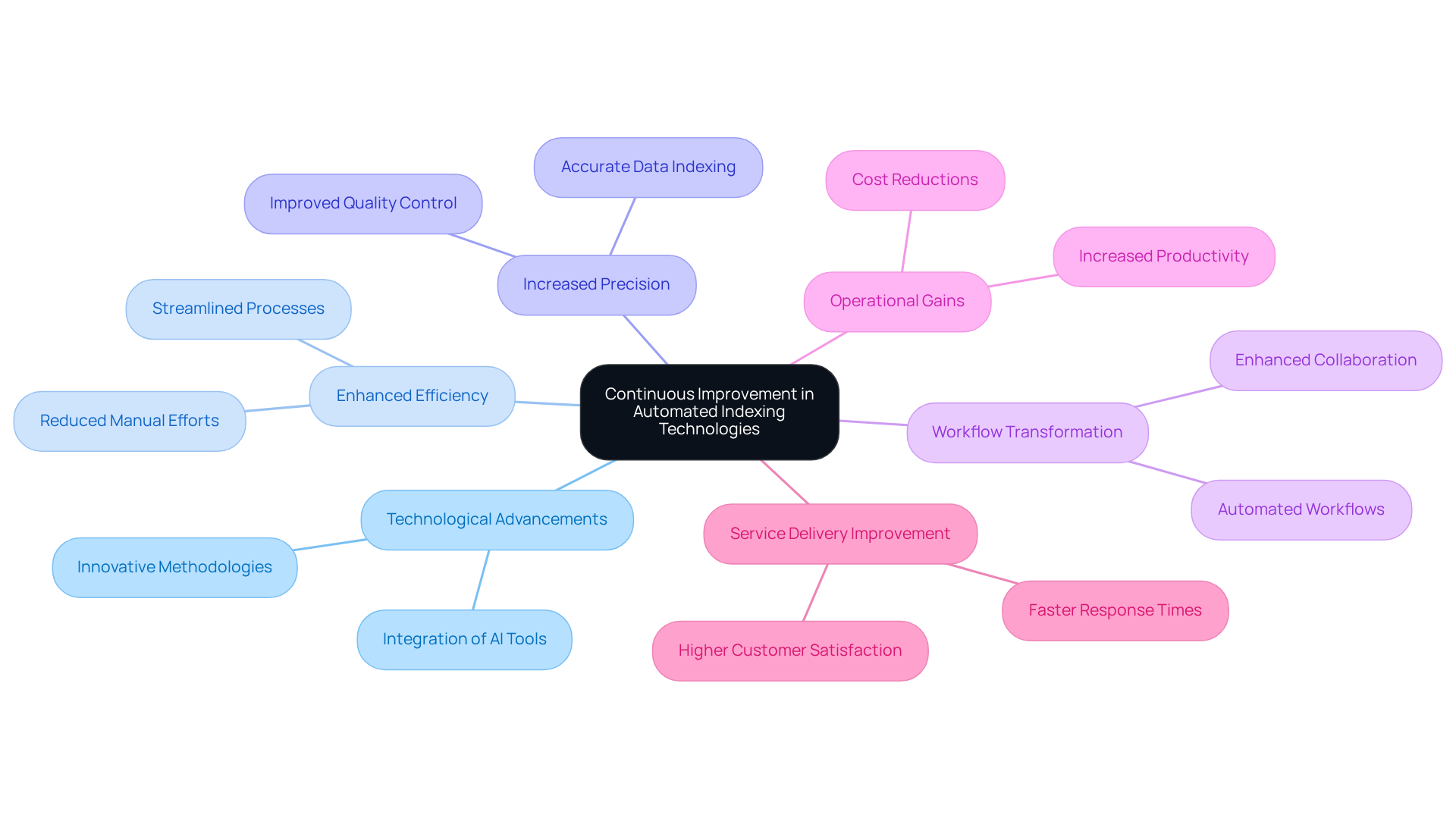
Conclusion
The automated indexing of property maps signifies a transformative approach in title research, greatly enhancing the efficiency and accuracy of document investigations. By integrating advanced technologies such as machine learning and optical character recognition, Parse AI streamlines the data extraction process. This allows title researchers to concentrate on more complex tasks while minimizing the time and errors traditionally associated with manual indexing.
Key benefits of automated indexing are substantial reductions in human error, faster access to information, and significant cost savings. The ability to retrieve indexed maps swiftly not only accelerates decision-making but also provides real estate professionals with a competitive edge in a rapidly evolving market. Furthermore, the assurance of data accuracy supports legal compliance, fostering trust and reliability in property transactions.
As the landscape of title research continues to evolve, embracing automated indexing solutions is not merely an option but a necessity for organizations aiming to enhance productivity and service quality. By leveraging these innovative technologies, firms can position themselves for sustainable growth and success in an increasingly complex real estate environment. The future of title research lies in the integration of automation; those who adapt will undoubtedly reap the rewards of efficiency, accuracy, and improved operational capabilities.
Frequently Asked Questions
What is Parse AI and how does it enhance title research?
Parse AI is a technology that revolutionizes document investigation through automated indexing of property maps, utilizing machine learning and optical character recognition (OCR) to efficiently extract and organize data. This significantly accelerates research timelines, allowing title researchers to focus on more complex tasks.
How does automated indexing reduce human error?
Automated indexing minimizes human errors by automating the extraction and organization of data, which mitigates mistakes that can occur from manual data entry or interpretation. This reliability is crucial for maintaining accurate property records and ensuring compliance with legal standards.
What are the benefits of using Parse AI in property transactions?
The use of Parse AI enhances productivity by reducing data entry mistakes by up to 90%, cutting clearance time from 2-4 hours to 20 minutes, and reducing document retrieval time by 50%. This allows document investigators to make informed decisions more swiftly.
What subscription options are available for Parse AI services?
Parse AI offers flexible subscription options including monthly plans, annual plans, and pay-as-you-go plans, allowing users to select the best fit for their requirements.
How does rapid access to indexed property maps benefit real estate professionals?
Rapid access to indexed property maps transforms document investigation by allowing property researchers to retrieve maps quickly, accelerating decision-making and enhancing overall efficiency. This enables real estate professionals to respond to client inquiries and finalize transactions more rapidly.
What is the industry's outlook on automation in document analysis?
A recent survey indicated that 88% of respondents plan to utilize digital technologies to enhance company performance over the next 12 to 18 months, highlighting a significant shift towards automation in the industry.
How can companies assess the impact of automated indexing on their workflows?
Companies should consider adopting automated indexing of property maps and regularly evaluate its impact on workflow efficiency to capitalize on the advantages of this technology.




